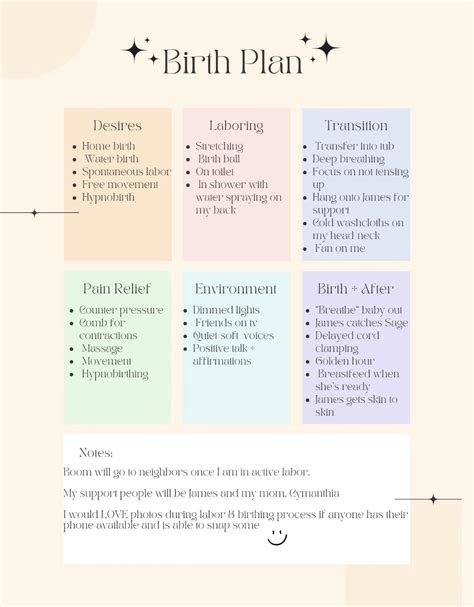What Is A Birth Plan

Having a baby is one of the most significant events in a person’s life, and it’s natural to want to feel prepared and in control of the experience. A birth plan is a document that outlines a mother’s preferences for her labor, delivery, and postpartum care. It’s a way to communicate her wishes to her healthcare provider and other medical staff, ensuring that her needs and desires are respected and prioritized.
A birth plan typically covers various aspects of the birthing process, including:
- Labor preferences: This may include the mother’s preferences for pain management, such as natural methods like breathing techniques, massage, or hydrotherapy, or medical interventions like epidurals or oxytocin augmentation. She may also specify her desired labor position, like walking, squatting, or using a birthing ball.
- Delivery preferences: The birth plan may outline the mother’s preferences for the delivery itself, such as:
- Episiotomy: Whether she wants to avoid an episiotomy (a surgical incision made in the perineum to widen the vaginal opening) or have one performed if necessary.
- Instrumental delivery: Whether she prefers to avoid forceps or vacuum extraction, or have them used if necessary.
- Perineal massage: Whether she wants her perineum massaged during labor to reduce the risk of tearing.
- Postpartum care: The birth plan may cover aspects of postpartum care, such as:
- Skin-to-skin contact: Whether she wants immediate skin-to-skin contact with her baby after birth.
- Breastfeeding support: Whether she wants assistance with breastfeeding, such as help with latching or positioning.
- Newborn procedures: Whether she wants her baby to receive certain procedures, like a vitamin K injection or eye ointment.
- Interventions and complications: The birth plan may outline the mother’s preferences for handling potential complications or interventions, such as:
- Fetal monitoring: Whether she wants continuous fetal monitoring or intermittent monitoring.
- Induction: Whether she wants to avoid induction or have it performed if necessary.
- Cesarean section: Whether she wants to avoid a C-section or have one performed if necessary.
Creating a birth plan can be a valuable exercise for expectant mothers, as it encourages them to think critically about their preferences and priorities. It can also help healthcare providers understand their patients’ needs and values, leading to a more collaborative and satisfying birth experience.
To create an effective birth plan, expectant mothers should:
- Research and educate themselves: Learn about the different options and interventions available during labor, delivery, and postpartum care.
- Discuss with their healthcare provider: Share their preferences and priorities with their healthcare provider to ensure they are supported and respected.
- Prioritize their needs: Focus on the aspects of the birth experience that are most important to them, such as pain management, breastfeeding support, or skin-to-skin contact.
- Be flexible: Understand that birth is unpredictable, and be open to adjusting their plan if necessary.
By creating a birth plan, expectant mothers can take an active role in shaping their birth experience, ensuring that their needs and preferences are respected, and promoting a positive and empowering birth experience.
What is the purpose of a birth plan?
+The purpose of a birth plan is to communicate a mother's preferences and priorities to her healthcare provider and other medical staff, ensuring that her needs and desires are respected and prioritized during labor, delivery, and postpartum care.
What should be included in a birth plan?
+A birth plan should include the mother's preferences for labor, delivery, and postpartum care, such as pain management, delivery positions, and newborn procedures.
Can a birth plan guarantee a certain outcome?
+No, a birth plan cannot guarantee a certain outcome. Birth is unpredictable, and things may not always go as planned. However, having a birth plan can help mothers feel more prepared and in control, and can promote a more collaborative and satisfying birth experience.
In conclusion, a birth plan is a powerful tool for expectant mothers to take control of their birth experience and ensure that their needs and preferences are respected. By creating a birth plan, mothers can prioritize their health and well-being, promote a positive and empowering birth experience, and set themselves up for a successful and satisfying postpartum journey.



